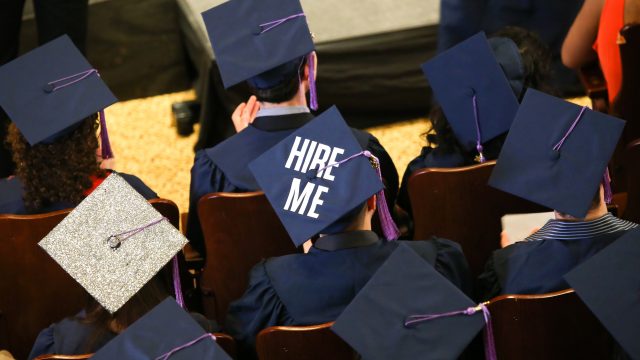“A good education and skills for the workforce are not synonymous"

May 10, 2014 - Syracuse, New York, U.S. - A student from the Syracuse University School of Architecture wears the words 'HIRE ME' on his graduation cap during the commencement ceremony for the School of Architecture at Syracuse University in Syracuse, New York. (Credit Image: © Nicolaus Czarnecki/ZUMA24.com)
Over at Watchdog today I have an article up about a study linking fracking to high school dropout rates (my previous post here). Two experts I spoke to told me the correlation between fracking and dropout rates wasn’t a good one.
“I don’t think it’s just a boom in energy. A manufacturing boom would have had the same result. Laying it at the feet of the energy industry is really irresponsible,” workforce development expert Kent Ellis told me.
“Any economic opportunity that presents in this particular fashion it’s an opportunity for relatively low skill labor,” University of North Dakota economist David Flynn said.
But what was interesting, I thought, were the comments these men had about the relationship of education to career. Flynn pointed out that recent years have turned the relationship between technological advancement and skilled labor on its head, and Ellis pointed out that not every good career path leads through college:
Ellis said school curriculum focuses too much on “a good education” and not enough on career skills.
“We’ve had this overwhelming focus on getting out of school and getting back into school without any real focus on what these young kids really want to do,” Ellis said.
Ellis pointed to data from the U.S. Census Bureau to make his point. According to data from 2014, in Grand Forks County — home to the University of North Dakota — 92.5 percent of residents have a high school degree, 32.6 percent have a bachelor’s degree or higher, and median household income was $46,745.
He contrasted those numbers with data from Oliver County, home to both coal and oil energy development. There 87.5 percent of citizens have a high school degree, 16.4 percent have a bachelor’s degree or higher, but the median household income $71,250, or 52 percent higher than in Grand Forks County.
“A good education might be a PhD in philosophy, and then you’ll understand why you don’t have a job,” he said. “A good education and skills for the workforce are not synonymous.”
Flynn pointed out the relationship between the workforce and technological change in recent years is a sharp departure from historical norms.
“It’s interesting that it goes against the grain of much of the 20th and early 21st century where technological change allowed for higher returns for skilled labor,” Flynn said of the opportunities created by the energy industry. “What you’re seeing now is technological change allowing for higher returns to unskilled labor.”
Ellis went so far as to say that kids dropping out of high school to get oil boom jobs haven’t been impacted by the energy industry so much as they’ve been failed by school policy. “It’s almost like they were repelled by the education industry,” he said. “What the energy industry did is provide them with an outlet for a high-paying career.”
He says schools aren’t doing enough to impart career skills to students. I think he’s probably right.
Americans have adopted a “college for everyone” attitude. Through public policy we have essentially turned student loans into an entitlement, and we push our kids into college right after high school with little thought given to what value a college degree might provide them.
This has all been great for the higher education industry, where campuses have grown decadent and payrolls have bloated, but has it been good for society? The price of tuition at America’s universities has quadrupled over the last 35 years. Has the value of a degree quadrupled as well?
I don’t think so.
Which isn’t to say that college isn’t the right choice for many students. But consider for a moment the situation we’re putting high school graduates into. We’re asking them to choose which degree path they want, and by extension what career they want, for the rest of their lives and then invest tens of thousands of dollars into getting that degree. Usually financed by debt.
No wonder the dropout rates in college are so high. We’re setting the kids up to fail when many of them would be better off getting a job.




